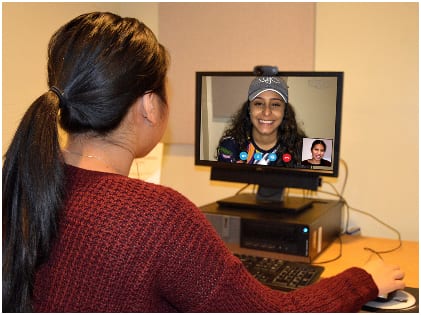The whole world is living amidst a lot of stress amidst the coronavirus scare. It is thus forcing people to stay within the confines of their homes and maintain social distancing. Now, as you are one of those who have to stay back and work from home, social mixing is a strict no-no for you. Moreover, there is an added work pressure which doesn’t seem to lessen at all. Stress eating in such tough times is a big factor that can take a toll on your health. Eating disorders can make you obese, and you might on to develop diabetes as well. If you are not into workouts, you are in for a risky phase. Here’s how you can stop overeating while staying indoors.
Connect With Your Loved Ones
 In these times, there are very few entertainment options left. Your entire focus might get shifted to food. However, you need to stay healthy at any cost since there are restrictions on medical facilities at this point. The United States Substance Abuse and Mental Health Services Administration suggests that the best thing you can do amidst a pandemic is to maintain and increase connection with your near and dear ones.
In these times, there are very few entertainment options left. Your entire focus might get shifted to food. However, you need to stay healthy at any cost since there are restrictions on medical facilities at this point. The United States Substance Abuse and Mental Health Services Administration suggests that the best thing you can do amidst a pandemic is to maintain and increase connection with your near and dear ones.
It’s mandatory as these are the times when you can’t go out and meet them. You are bound to feel lonely, and all you would do is gorge on fatty foods to pacify yourself. You need to stay in good shape and the pink of health. Try to keep that in mind. Stress eating would do you no good, except for increasing your cholesterol levels and help you gain a lot of weight.
Realize The Difference Between Emotional And Physical Hunger
 In stressful times, it might be tough for you to say whether your mind is distracted towards food or your body needs nourishment. What you need to do is synchronize your mind with your body. There are some physical symptoms associated with your physical hunger. In case you feel hungry even after eating a full quota of your meal, there are high chances either you are feeling lonely, or you are stressed out.
In stressful times, it might be tough for you to say whether your mind is distracted towards food or your body needs nourishment. What you need to do is synchronize your mind with your body. There are some physical symptoms associated with your physical hunger. In case you feel hungry even after eating a full quota of your meal, there are high chances either you are feeling lonely, or you are stressed out.
If you can understand the difference, try to address your emotional needs so that you can avoid the feeling of frequent hunger. Make sure that when you eat, you don’t have any distractions around you. Refrain from watching TV or using mobiles or any kind of gadget. Stop immediately when you feel you are full. Keep the rest aside for your next meal.
Never Splurge
You can’t keep your hands off the goodies completely. Well, that’s not possible. However, even if you want to indulge in stuff that you love, try not to go overboard. If you are craving for a cookie right after your lunch, make it a point to reduce the carbs that you generally have in your meal so that you can fit in the carbs that come with your cookie.
Remember, this is not about restrictions. It’s all about how you balance the two. Overindulging can leave you sluggish. All you need to do is savor every bite of your meal and stay away from piling on more into your poor stomach. Consistency and balance are two critical factors here.
Think Before You Drink
 Drinking ample water throughout the day is mandatory. Water flushes out the toxins in your body. Avoid any kind of sugar drinks and products which have good content of artificial sweeteners in them. Excess amounts of sugar tend to weaken your body’s immunity, while artificial sweeteners can have drastic effects on your body’s natural appetite. In case of alcohol, stick to one to two drinks in a day.
Drinking ample water throughout the day is mandatory. Water flushes out the toxins in your body. Avoid any kind of sugar drinks and products which have good content of artificial sweeteners in them. Excess amounts of sugar tend to weaken your body’s immunity, while artificial sweeteners can have drastic effects on your body’s natural appetite. In case of alcohol, stick to one to two drinks in a day.
You can avoid alcohol by engaging yourself in other activities like reading books, playing video games, or having a conversation with your family and friends. Drinking too much alcohol would increase your appetite and can lead you to overeat, which is harmful. You will probably gorge on foods that you wouldn’t taste in a sober state of mind.
The present condition can lead you to break all barriers and make your food habits a bit erratic. These strategies might help you overcome the craving to overeat. Adjusting to an unusual routine is tough, but you have to learn the ways through which you can deal with it.
